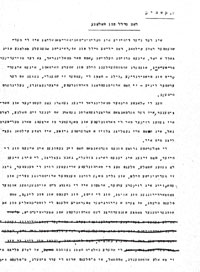Roza Shilman was born in 1921 in the town of Polonnoe, Ukraine.
After the outbreak of war on June 22, 1941 Roza served as a nurse in a military field hospital, providing first aid to wounded Red Army soldiers whom she helped remove from the battlefield. During the battle of Stalingrad (August 23, 1942 - February 2, 1943) when the fighting became fierce, her medical battalion was transferred across the Volga. However, a small group, including Roza, remained inside the besieged city.
The article "The Girl from Polonnoe" by B. Kotik, prepared in 1942 for the Jewish Anti-Fascist Committee, described her devotion and courage:
"a group [of the medical battalion that remained in Stalingrad] set up its headquarters in one of the houses which by sheer chance had not been destroyed.… When the seriously wounded soldiers learned that Roza Shilman had remained with them, they calmed down. When the building shook from the terrific bombing and fires lit up the sky, they would beg her: 'We will manage somehow, save yourself.' But Shilman did not leave them. One day eleven enemy bombers attacked the medical headquarters. Whoever could walk sought shelter somewhere else. Several seriously wounded men remained in the ward. After she helped the wounded to find refuge, Roza returned to the ward. The noise outside was getting louder. Roza wondered how to distract the patients from the noise. This was no time for telling stories or reading books. She came up with the idea of putting on the phonograph. The famous opera singer [Valeria] Barsova was singing 'The Nightingale' [by Igor Stravinsky]. The attention of the men soon became focused on the music. They relaxed … completely forgetting their surroundings. In order not to destroy the illusion, Roza did not let the music cease for a moment. Again and again she played the record with Barsova singing until everything outside became quiet.…"
Roza Shilman was famous among wounded Red Army soldiers for her professionalism, care, and devotion. An another article in Yiddish "Roza Shilman" by Abe Lev, prepared for the Jewish press in the West, reflects this:
"During the fierce battles for Stalingrad the name of Roza [Shilman] became very famous. Wounded Red Army soldiers insisted that any soldier whose wounds Roza had bandaged would certainly return to the front cured since she had 'a healing hand.'"
On September 28, 1942 Roza Shilman was awarded the Combat Merit medal. Her decoration certificate attributed this to:
"her extraordinary care for seriously wounded soldiers and commanders. During three days and nights, under quite difficult combat conditions she did not abandon her post, working without sleep or rest, remaining with the seriously wounded. She skillfully and in a timely manner organized the feeding of the wounded and filled prescriptions [for them]."







